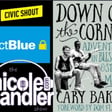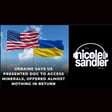Become a Creator today!Start creating today - Share your story with the world!
Start for free
00:00:00
00:00:01

Follow the Moneyball Episode 1 - Sports/Entertainment Attorney RIcky Volante
Welcome to the Follow the Moneyball Podcast, hosted by veteran agent for Major League Baseball Players David Sloane.
For his inaugural episode, David speaks with his attorney Ricky Volante, who specializes in sports and entertainment law.
Transcript
Introduction to 'Follow the Money Ball' and Host
00:00:07
Speaker
Welcome to Follow the Money Ball at the intersection of sports and money with a healthy dose of funny and irreverence too. Here's your host, David Sloan. Welcome to Follow the Money Ball. I'm David Sloan and I have opinions. I also have 44 years of experience as an agent for MLB players to back up those opinions.
Guest Introduction: Ricky Volante
00:00:27
Speaker
I'm going to be talking about intersection of sports and money with a variety of guests that I believe you will find very interesting.
00:00:36
Speaker
Let me introduce my very first guest, Ricky Volante. Ricky is an attorney who specializes in sports and entertainment law. He is the chief executive officer and general counsel of the Professional Collegiate League, as well as a partner in RVIS Media Partners. And he's my
Ricky's Early Sports Involvement
00:00:54
Speaker
attorney. He has been practicing in this area for eight years and fund every moment, right? Never a dull moment, at least.
00:01:03
Speaker
So one of the things that I have the greatest amount of interest in is origin stories, so to speak. And that being said, I think it's always best to start at the beginning of the story. Where did you get your start? I assume as almost everyone who I have encountered in the world of sports, that when you were a young man, you were involved on the playing side of sports, correct?
00:01:27
Speaker
That is correct. I was probably four years old when I started playing baseball and soccer. So it's been a, I think, a life of love, I guess, for most sports. And as a fan, yes, far back as I can remember, I've always loved watching and going to games. So four years old, damn, you were a prodigy.
Choosing Between Sports in High School
00:01:54
Speaker
I don't know about that, but, uh, growing up in the middle of nowhere in Virginia, there was a little else to do other than play sports. I guess, I guess. So football and soccer now, as you grew up, did those continue to be the sports that you focused on? Yeah. So, um, Virginia had, when I was a kid, a lawsuit actually that I believe was brought by the cheerleaders.
00:02:21
Speaker
or a group of cheerleaders in Virginia that ended up resulting in soccer being moved to the spring. So unfortunately when I got to high school I had to choose between baseball and soccer and maybe
00:02:36
Speaker
looking back on it, foolishly chose baseball. Uh, but at the same time, it led me to where I'm at today, which, uh, so I guess not so foolish. So why do you say foolishly? Were you, were you a better soccer player than a baseball player? I definitely was. Really? Yeah, I was good at baseball and, um, especially good for, from the area that I came from, which had a tradition of producing a handful of, of players.
00:03:03
Speaker
that at a minimum played in the minors, a couple of them, I think even might have had a cup of coffee in the majors. But that said, I was a much better soccer player. Really? OK. Well, that's very interesting.
Football and Parental Concerns
00:03:17
Speaker
At that level now, you said it was high school where you had to make the decision to transition from soccer to baseball. But you still played football, correct? I played football for one year. So actually, my parents
00:03:31
Speaker
would not allow me to play football for the longest time. If I recall correctly, my dad had a friend who was paralyzed from the waist down.
00:03:40
Speaker
And my mom had seen a handful of her friends and her brother's friends, because her brother went to Virginia Tech for football, who all sustained long-term injuries and things like that. So it was not until my junior year of high school that I was allowed to play football, which as you can guess by that point, the ship has kind of already left the dock in terms of the coach's perspective on who's getting playing time.
00:04:08
Speaker
but I did play for a year, still in high school. Okay, and so then you didn't play your senior year? No, because at that point I was travel ball
Baseball Dedication and Challenges
00:04:19
Speaker
uh... on the baseball side so it was it was you know you're around on twelve-month yeah twelve-month commitment right right that's um... for better for worse it seems that uh... is what baseball has kind of uh... i would say devolved into uh... i know in my particular career as an agent it uh... more from the point where you had guys who played multiple sports
00:04:48
Speaker
and were very good baseball players who eventually got to where they decided that or it was decided for them that the best route to a college scholarship or a potential pro career was to focus strictly on baseball and it went from you know the occasional showcase or if you were really good enough the
00:05:10
Speaker
area code games or what have you to perfect game once they got involved it was just a non-stop series of this showcase and that showcase and the other showcase and again it became a year-round I wouldn't avocation let's say and and when you weren't playing you were training correct yeah so when I was 14 my parents
00:05:38
Speaker
set me up with a personal pitching coach. And again, unfortunately, where I lived, you had to drive about 45 minutes to get to anybody that was worth taking their advice. So two to three times a week from all four years that I was in high school, I was driving 45 minutes to an hour to go to a personal pitching coach. And then when I was 16, I started playing showcase on top of
00:06:08
Speaker
high school ball and little league.
00:06:11
Speaker
I see. I see. Well, yeah, that that's quite a commitment. And all this time you were also in school and obviously you were a good student, I would assume. And that took up a lot of your time as well. So so now let's say you're in your senior year and you are shooting for either college or potentially a pro opportunity as far as baseball was concerned.
00:06:41
Speaker
And how did that work out? Yeah. So a couple of things I would say on the educational side, I went to what was essentially a college prep private school from the age of five through eighth grade. So when I was in high school, frankly, I was kind of bored.
00:07:00
Speaker
on the educational side because I went from having an hour plus, I think the school rule was no class could give you more than an hour worth of homework and we had seven classes. So, you know, we were, you know, doing a lot on the schooling side. So by the time I got to high school, that was very much in cruise control and I was focused on the baseball side and
00:07:25
Speaker
When I was a senior, our team ended up going to the state championship finals. We were eliminated in the regional semi-final my junior year, went to the state finals my senior year. And then during that season, I had
00:07:44
Speaker
either an impingement or stretch labrum in my right shoulder. So I was doing on top of the personal pitching coaching on top of the, the showcase ball. Uh, I was also going to a physical therapist three times a week to, um, address my issues with my shoulder. Um, and I had to be ramped up throughout the season from the bullpen into the starting rotation still ended up throwing almost 70 innings in that compressed season. That's a lot.
00:08:14
Speaker
And yes, it ended up leading to where we're going to get to in a moment. But during that time, I was being scouted by a handful of D1 schools. Off my memory, it was West Virginia, Coastal Carolina, George Mason. And then there was the University of Richmond, Catawba College down in North Carolina. I think they're D2.
00:08:44
Speaker
But unfortunately, I could not go to any of their showcases that they had because of my injury. So I ended up kind of getting written off by most of the college scouts, despite the fact that I had quite a good year on the field.
00:09:03
Speaker
Virginia is an area that is known for producing quite a few very good players. Were any of your teammates on your high school team or your travel ball teams, were any of them able to play college ball or pro ball? Our center fielder from my high school team ended up playing at Hamp Sydney, I believe. I think he might have been the only one of us
00:09:30
Speaker
Excuse me, our second baseman also ended up playing, I believe, at Randolph-Macon. So low D3 in Virginia. We had a couple of guys that ended up playing college ball. And then I ended up playing college ball as well. And on my showcase team, I played with one of Verlander's younger
College Baseball and Injury
00:09:52
Speaker
brothers. So I believe he never played college, but he was there.
00:10:00
Speaker
Frankly, I kind of lost track of those, of a lot of those guys. I would imagine given the talent level that several of them played college and to your point, given the area in Virginia that we were in, there were a lot of like, we played Gushwin who's starting pitcher at a full ride to Virginia Tech, their catcher slash first baseman at a full ride to Virginia.
00:10:22
Speaker
um, Goochland's also where the Verlanders are from. Um, so we, we certainly played a lot of talented players that I know ended up playing in the college rakes. Wow. So that was pretty decent competition and must've given you a taste of what was out there. So now, uh, when you went to college, did you go with the intention of playing baseball? Yes. Yes. I went, started at the University of Maryland, Washington.
00:10:51
Speaker
which at the time they were ranked in division three and their coach was also a part-time scout for the Yankees. So it was definitely a star-studded division three team. And then unfortunately, so I won the freshman of the year award for the fall season and then my very first pitch of my first appearance in our first spring scrimmage.
00:11:20
Speaker
I tore my UCL. Nice timing. Great timing. So, um, and unfortunately it was one of those diagnosis where they couldn't tell if it was a complete tear or not. So first we tried to go the non-surgical route in terms of physical therapy and recovery. Um, that didn't work. That didn't take, um, we had built myself back up, you know, to the point that I was going to get on the mound and, and,
00:11:49
Speaker
immediately it didn't feel right. And so then I ended up having the surgery my second week of my sophomore year. That kept me out obviously for the entirety of my sophomore year while going through physical therapy. And then at that point I transferred to Lake Erie College just outside of Cleveland, Ohio, which was a Division II program and played there my junior and senior year.
00:12:18
Speaker
So it took more than a year from the time of your initial injury until the time you had the surgery. Yeah. So I remember pretty well the first time I threw up a mound post surgery and it being like kind of one of the most terrifying moments of my life. Cause you know, you, you've just spent all of these months or year plus, you know, going through,
00:12:46
Speaker
If you tack on the physical therapy treatments I did pre-surgery, it had been about 17 months or so between the point at which I tore my UCL to the next live scrimmage setting where I was throwing off a mound. Like I said, it was kind of terrifying because you don't know if you're going to have that feeling again.
00:13:12
Speaker
Yeah, well, in addition to that terrifying feeling, I'm sure that the physical pain was no day at the beach either. So when you did come back, where were you in terms of comparing to where you had been before the injury? Were you 70% the player, 80%? Where would you say that you were at that
00:13:40
Speaker
75% or so. So pre-surgery, my senior year of high school and going into that fall season of my freshman year, I was consistently 89 to 92. I had a really good slider, pretty good curve ball, and I was developing my change-up. And then post-surgery, I think
00:14:05
Speaker
I might have topped out at 86 once. And so that was super frustrating because, you know, to know that you had it and then not have it anymore. Yeah. It was not easy. Yeah. I forget who it was that said it, but there was a player from back in the fifties or sixties who said I was throwing the ball just as hard as I ever did. It just didn't get there as fast. Exactly. Yeah. Yeah.
Shift to Sports Management and Law
00:14:33
Speaker
So now, in the meantime, when you were going through all this process, is that what made you consider a career involved in sports, but not as a player? What did you major in when you when you went to college? So when I went to Mary Washington, I was pre poli sci.
00:14:58
Speaker
and had always had somewhat of an interest in working in politics and being in Virginia and right there by DC was something that intrigued me. But very quickly when I got into the coursework, I was like, no, this is not me. And when I transferred up to Lake Erie, I ended up majoring in sports management. And that was when I kind of realized, well, you know,
00:15:27
Speaker
can't be the ace of the now Cleveland Guardians, maybe you can one day be the GM, or something along those lines. That became sort of my goal. Fortunately, I had a really good advisor who, still a very good friend of mine to this day, and mentor who said,
00:15:50
Speaker
If you want to work in professional sports, you know, MBAs or dime a dozen these days, you know, maybe you should consider going to law school instead. And that was, I think like a month before the second to last round of LSAT, my senior year. So I very quickly like just dove headfirst into the idea and actually took the LSAT the first time with concussion because I had been rear-ended on the drive back up to get it to have the
00:16:20
Speaker
in the Cleveland area, didn't do so hot, took it a second time, did much better. At that point, I was sort of on my way to law school. Really? So you had no prior interest in the law?
00:16:33
Speaker
You know, A Few Good Men was always one of my favorite movies and is to this day. So like, I guess thinking back on it, I always thought it was, it was something that was intriguing. You know, the, the concept of being a lawyer, Jag was also one of my favorite shows as a kid. Um, so I certainly saw plenty of it on TV, but never had really thought of myself in, in that sort of a setting. And I had no family who I,
00:16:59
Speaker
I believe I was the first member of my family on either side to even get graduate degrees, so I certainly didn't have anybody within my family to be like, oh, yeah, so-and-so is a lawyer. I can talk to them. So I had no one that I really knew. I didn't even know a lawyer at that point in my life, so I had never really thought about it. So no formal role model, then, in terms of I want to grow up to be Perry Mason or the guy from LA Law or something like that, then?
00:17:26
Speaker
That's very interesting. Um, and, and you were more, let's say motivated to look into the management side of sports as opposed to, um, the, the representation side of things. Yeah. I was growing up, my brother and I put so many time, so much time and hours into
00:17:52
Speaker
the likes of Madden and MLB 2K and All-Star Baseball when that used to be a thing and always building teams. So that was always the context in which I considered it. And fortunately again, fortunately, I ended up going to Cleveland State's law school and my eventual mentor, a gentleman by the name of Peter Carfania,
00:18:18
Speaker
had been the Chief Legal Officer General Counsel of IMG when IMG was the preeminent sports agency when they had Casey Close and Tom Condon and Jeff Schwartz, all those guys on the team sports side and on the individual sports side they had
00:18:44
Speaker
Um, uh, Stephanie Johnson and they had, uh, Gavin Forbes. So like they had golf and tennis. So like he, you know, had done a ton of player representation stuff in the legal context. And that kind of opened my eyes to the idea of working on, on that side of the table. And, um, yeah, he was definitely a big influence on me.
00:19:06
Speaker
throughout my law school career. So from that perspective, or at that time in your life, you kind of decided to take the route away from the roster building, so to speak, on behalf of a team and in the direction of building a client base for you as a practicing attorney. Exactly.
Law School and Early Legal Career
00:19:26
Speaker
Yeah. And at that same time, I ended up becoming a agent for a couple of soccer players. One of them was
00:19:36
Speaker
gentleman who I he was Spanish born he was playing for a Slovenian Premier League club and he was looking to transfer to the US and he connected with me on LinkedIn because he had seen some some videos that I had recorded with Professor Carfania and said hey would you be interested in potentially being my intermediary and negotiating a deal for me to come to the States in either the
00:20:04
Speaker
U.S.L., the N.A.S.L., or N.L.S. N.A.S.L. is now defunct for all intents and purposes, but we ended up, I ended up securing a deal for him to Puerto Rico FC, who was a member of the N.A.S.L., and they were owned by Carmelo Anthony at the time, and I remember sitting in my, essentially the equivalent of my legal ethics class
00:20:34
Speaker
and getting an email from the club's sporting director saying that Carmelo had signed off on the contract because the contract we negotiated made my guy the highest peak player on the team. And so Carmelo had to sign off on the deal because of that. And so that was a super cool email to get. And we could probably have a discussion around ethics of morals of whether I should have read that email while sitting in that class.
00:21:01
Speaker
nevertheless I was very excited to see it. Well it would seem to me the toughest thing at that point would have been to not jump up and high-five yourself in the middle of the class which might not have gone over well with your professor. So tell me something in terms of that experience
00:21:19
Speaker
Is it in that world of soccer similar to the way it is with baseball and I know football and I assume basketball where you have to acquire a license in order to be able to be an agent for players or is it just a matter of saying this guy wants me to represent
Becoming a Soccer Agent
00:21:40
Speaker
him?
00:21:40
Speaker
So at the time, the rules actually just changed. FIFA just instituted a agent certification process that now applies globally. But at the time, they had essentially deferred. So you have FIFA, which is the international governing body of soccer. And then each region has its own regional entity. So Kankakov here in the US,
00:22:07
Speaker
which oversees Canada, Mexico, the U.S., Central America, and the islands. And they had then deferred it to basically the national organization that oversees the sport of soccer in that particular country. So in the U.S., that being the U.S.S.F., and U.S.S.F., basically their process was send us a check. So you fill out this form, send us a check, and then you're an anchor.
00:22:38
Speaker
And so I did just that and didn't have to take a test or anything.
00:22:44
Speaker
You know, I honestly, I didn't even get confirmation from USSF that they had received everything and that I was on the list. It was just one day I went to their website and I was on the list and that was it. Wow. That's, uh, that's expedited. Let's call it. So, so now you are, so, so now you are a, uh, at this point in, in, in your career, you had been admitted to the Ohio bar, correct?
00:23:12
Speaker
No, so when I was representing the soccer players, I was still in law school. Oh, okay, I see. So once you graduated law school, you were then admitted to the Ohio Bar, right? Right. And at that point, you decided to full on pursue the career on the sports side of the Ohio Bar, so to speak.
00:23:36
Speaker
Yes. So I very quickly realized I did not want to be an agent.
Transition to Legal Counsel
00:23:43
Speaker
I represented a few musicians as well at the same time that I was representing those couple of soccer players. And again, I did the work, but I realized it really wasn't something that I wanted to do. I realized that while I wanted to be on the deals for athletes,
00:24:04
Speaker
and or entertainers, I more wanted to be viewing it from the perspective of the transactions and not necessarily be doing all the hand holding that goes on as the agent. And so I did transition out of being a manager of talent and an agent of talent and transitioned more to being legal counsel for players individually
00:24:28
Speaker
and for agencies as well as a whole to serve as sort of in that outside counsel role where they bring me in on the transactions to either simply review the agreements, make sure there's no issues, and or in some cases, negotiate the agreements on the player's behalf. So what is the difference in that instance that you just mentioned, negotiating on the player's behalf as opposed to acting as the agent for a player?
00:24:56
Speaker
When there's something that they want at 2 a.m., I'm not the one they're calling. Right. But in terms of actually saying the contract's going to be three years as opposed to four and there's going to be this amount of money paid in year one, year two, year three, you're still doing those terms? No. So in those situations, that's where the licensing requirements kick in, players associations.
00:25:24
Speaker
I may advise, I may give my opinion, I should say, to an agent on what I think a player should be getting, but I'm more focused on the off-the-field stuff, so if it's an NIL deal in the college context or it's an endorsement agreement in the professional context, I will be the one that comes in and again, at a minimum, review the contract and make sure that there are no conflicts with other deals that they've already signed, that there's no
00:25:53
Speaker
Um, you know, really bad terms for the player mixed into the contract somewhere, make sure that the player really understands what they're committing to. Cause there's always an expectation that the players are going to be doing certain things. Uh, and then, you know, I'll give it the thumbs up and tell the agent.
00:26:12
Speaker
and player, you know, it's ready to go when you guys are ready to go as far as the legal side of it goes. But yeah, the player representation side and the negotiating the team side, that's left to the agents. Oh, okay. So you're more going to, for example, take a look at the guarantee language and essentially certify, for lack of a better term, that there's no holes in the guarantee that the player or his agent need to worry about.
00:26:42
Speaker
Right. And, you know, again, if it's players endorsement deal, like I can think of one example where a player was presented with an agreement by an apparel company and had already done a campaign with a, for lack of a better term, dresswear company. And so we had to go through and carefully define the category to make sure that there was no conflict between the existing deals. So like, I'll do those sorts of things as well to make sure the player can
00:27:11
Speaker
make as much money as possible and not infringe on any existing contracts and not need to hire you to represent him in litigation because the one company or the other is suing him for breach of contract
00:27:23
Speaker
So what you chose to do was not the agent side of things, but more the counsel for the agent and or the player making sure that the deal as negotiated by the agent is clean and conforms to the rules of the league and the laws of the state and country and universe.
Attempt to Disrupt College Sports
00:27:45
Speaker
And that was where your career was at that point. So now, let's move forward from there and go into the various experiences that you've had. I know, for example, you were involved with a nascent, let's call it, alternative to the NBA and somewhat of a competitor, if you will, for the G League.
00:28:13
Speaker
and why don't you tell the listeners about that and how that worked out.
00:28:18
Speaker
Yeah, so when I was wrapping up law school, I got an email from my antitrust professor who said, hey, this antitrust economist reached out to me. He's looking for somebody who's interested in co-writing a note on the O'Bannon decision. And he's got the economic side covered. He just needs somebody to provide the legal context within the note. And I said, I'd love to. Connect me.
00:28:46
Speaker
And that ended up being a gentleman by the name of Andy Schwartz. He was the non-testifying economic expert against the NCAA in the white O'Bannon and most recently Alston cases against the NCAA. The Alston case was the one that went before the Supreme Court a couple summers ago. And in the course of us writing this legal note together for Marquette, we realized that we
00:29:16
Speaker
saw eye to eye on how we thought college sports was ripe for disruption. And out of that was born the PCL, it had a few different iterations where at one point we were attempting to get historically black colleges and universities, HBCUs, to break away from the NCAA and then it ended up
00:29:39
Speaker
more in a model where it was simply going to be, you know, standalone teams that were all going to be owned and operated by the PCL league office akin to like the MLS or Premier League Lacrosse or, you know, one of the other single entity leagues that's out there. And then we were going to have teams up and down the East Coast and we were right at sort of the
00:30:07
Speaker
breakthrough moment on the fundraising side and then global pandemic. So unfortunately, we did not have that in the old SWOT analysis for external threats that the world could shut down.
00:30:24
Speaker
Yeah, I know about that because it certainly affected a enterprise that I was trying to get up and running at the same time as well. So let me ask you this just in terms of overview of things. What do you see? So you've been involved in the
00:30:43
Speaker
At least tangentially, the Alston case, the O'Bannon case, so you're familiar with that side of things in terms of college sports. You've been involved on the other side in terms of professional sports. So let me ask you this. In terms of college sports,
00:31:00
Speaker
What do you see in the near future in terms of the biggest challenge for, and I hate to use this term because it's just inadequate to encompass the scope of the question, but college sports in general, do you think that TV rights and NIL issues are the biggest challenge or
00:31:27
Speaker
What do you see as the biggest obstacle that will be facing the schools and the conferences as opposed to the NC2A? Because in my not so humble opinion, the NC2A is a piece of shit organization that should have been done away with many years ago. There are fewer more corrupt entities that exist in the world today than the NC2A.
00:31:56
Speaker
always has been and nonetheless people who are in that sector of the world have to deal with the limitations that the NC2A rules place upon them. So I'd just be interested and I'm sure the listeners would be interested as to your perspective having been on essentially all sides of that particular issue.
00:32:22
Speaker
Yeah, we actually, I've also advised a couple of US senators and state reps on NIL bills and things like that as well, as well as collectives that have now
Challenges in College Sports
00:32:34
Speaker
formed. So I've definitely.
00:32:36
Speaker
definitely seen pretty much every side of this. Even the unionization efforts that happened during the pandemic, we kind of unofficially were consulting with a couple of those groups. I think that there's a handful of things that are, I don't know that you can necessarily rank order them because they're all
00:32:57
Speaker
significant in their potential impact and outcome. So you've got the NLRB procedure where athletes out of California have
00:33:11
Speaker
brought it forth to the NLRB that they qualify as employees under the NLRB rules and regs, which I have said for quite some time that they absolutely do meet those requirements. And the current director of the NLRB put out an opinion letter, probably
00:33:31
Speaker
18 months now ago and said that she indicated that if this issue were brought before me, I would be inclined to say college athletes and not just revenue sports, but all sports do indeed meet the definition of an employee. So that's going on. You've got the house case out of California, which has always been sort of the buildup point.
00:33:58
Speaker
You've got the same legal team that represented the players in the O'Bannon case and in the Alston case that are now representing the House plaintiffs. And this has always been in terms of the building blocks where they wanted to take this because every time they've brought one of these cases, they've been able to chip away a little bit more at the economic model of college sports. And this is the one that to your point may get to TV revenue.
00:34:25
Speaker
And I think that would be a seismic shift. That would be a real shift. I don't think NIL is as big of an impact as anybody likes to proclaim. So I think NIL, it certainly has had an impact to some extent, but I don't think it's been the seismic shift
00:34:45
Speaker
that some like to proclaim that it's been. And I think that those that proclaim that have a vested interest in either their reputational benefit or economic benefit of it being a seismic shift, because at the end of the day, college athletes have no more power than they had before.
00:35:03
Speaker
They may have a little bit of leverage from time to time in the recruiting cycles now, but that's not leverages in power. And at the end of the day, these athletes still have all of the exposures that they had before NIL when it comes to player health and safety, when it comes to, as we just saw at Northwestern, hazing and the imbalance of the power dynamics between the coaching staffs and the players.
00:35:32
Speaker
that lead to player harm. DJ Durkin, who killed a player, one of his players, is still a coach in college
Economic Impact of Athletes on Schools
00:35:40
Speaker
sports. I believe he's at Alabama now or maybe he's at one of the schools in Texas. He's bounced around in the SEC now for the last couple of years. I mean, he literally ran a player to death and he's still a coach in college sports. So there are far greater issues that don't get addressed.
00:36:00
Speaker
until we get to that power dynamic between universities and coaching staffs and the players. You know, there's also the issues on the educational side where everybody until they're blue in the face will try to tell me that college athletes get a lot of benefits, but at the same time, you know,
00:36:20
Speaker
Does it suck? Yes, but but it's reality. If you or I go to Ohio State University, we do not give the benefit to the school the same as your name, whichever great Ohio State player you want to name, you know, they are providing millions of dollars of benefits to the institution, both in terms of marketing and in terms of reputation of the school and all of that.
00:36:42
Speaker
filters into their ability to recruit not just athletes, but regular students too, because now you want to be at a school where things are cool. You know, the Flutie effect, which first happened after Doug Flutie's Hail Mary at Boston College and has been shown time and time again, when you have schools like George Basin and Florida Gulf Coast,
00:37:04
Speaker
who make a big tournament run in college basketball, you see this massive spike in applications and overall attendance at the school. So that, you know, college sports is the front porch. That is the mechanism that is used to be the brightest, biggest beacon for these campuses to recruit, again, not just other athletes, but to recruit regular students as well. So- And raise their tuition. And raise their tuition. So at the end of the day,
00:37:34
Speaker
you know, these athletes are providing massive economic benefits to these schools, and they really have no say in that. I mean, again, yes, I know NIL exists, but when you look at the numbers, yes, a guy like Bryce Young is getting seven figures, but very few others are. And again, that's where I go back to the players still don't have any power.
00:37:58
Speaker
which was what we were always trying to address with the PCL and what we've tried to address in other efforts to help college athletes. But until that changes, the NCAA and the schools, and going back to your original question, the schools are just as bad. Even if you got rid of the NCAA, these schools could have all walked away from the NCAA at any moment in time.
00:38:22
Speaker
And still, they don't need the NCAA, but they use the NCAA as sort of a shield for all of the bad PR. And at the end of the day, these schools and their leadership are as complicit in everything that happens to these athletes as much as the NCAA. And so even if you get rid of the NCAA, I don't think it really changes anything as far as how the athletes are treated by the schools, because again, they're right there doing it all too.
00:38:49
Speaker
Well, I saw this firsthand when I was in college at Arizona State. One of the years that I was there in 1975, they had the number two ranked team in the country at the end of the year.
00:38:59
Speaker
And there were players who were friends of mine, guys that I hung out with that were playing on the team that very easily could have been stars had they gone to another school. But because of the fact that they had great players like Mike Haynes and Larry Gordon in front of them, guys who went on to become first round picks, and in Haynes's case, a Hall of Fame,
00:39:20
Speaker
player they weren't getting player time playing time and the coaches always knew that they had them by the balls because They could prevent them from being able to to transfer easily and as a result of that there was there was no place for a Talented talented athlete like a gentleman who I knew there by the name of Carl Russell despite the fact that had he gone to another college where he would not have been playing and
00:39:48
Speaker
either behind or alongside a guy by the name of Mike Haynes, that he would have been a very big star. And the dynamic that you're addressing, the difference between power and leverage, it was addressed in a comedy routine by Chris Rock, who talks about the difference between
00:40:04
Speaker
Being wealthy and being rich and he put it very simply he said LeBron is rich But the guy who owns the Lakers is wealthy and it's the same thing You were talking about the players at Ohio State and the benefit that they bring to to the school even the minor players you know, someone has to block for Bryce young and That offensive guard who's blocking for him. Yeah, he's getting an education room board tuition and fees and
00:40:31
Speaker
But in terms of the toll it's taking on his time away from being able to devote to academics and the physical toll it takes on his body, there's certainly, I would call it, an imbalance in terms of compensation as opposed to what's going to the school compared to what the athlete is getting.
Risks of Legalized Gambling in College Sports
00:40:52
Speaker
What about the effect of gambling that is going on now legally in the overwhelming majority of states?
00:41:00
Speaker
In years gone gone by there were always point shaving scandals and things like that that were brought on by by gambling interests and Now those things are out from under the table and are out in the open What do you foresee in terms of the effect of that in the in the not too distant? If we don't square away
00:41:22
Speaker
real compensation and rights for college athletes, we're going to have a massive scandal at some point because you have all of the risk factors where you have talent that is either underpaid or not paid. You have young individuals who have, frankly, a decent amount of time on their hands. So you end up having sort of the boredom factor when they're not
00:41:48
Speaker
participating in their sport. They don't have all that much money or they don't have any money, but they're still high profile in a lot of ways. And unsophisticated.
00:41:59
Speaker
And yeah, I mean, we're talking about 18 to 22 year olds, so not to knock, you know, football players or basketball players individually, anybody that's 18 to 22 doesn't know all that much. Their brain's not even fully formed at that age. You know, so you have all these risk factors that are right there, and all it's going to take is for the wrong group of people
00:42:21
Speaker
the right group of people, depending on how you look at it, to realize that they can exploit the system quite easily. And they don't even have to impact the outcome of games to your point about point shaving. You know, if, if somebody gets offered, you know, six figures to miss a few free throws, and
00:42:41
Speaker
no one's going to be the wiser necessarily. It could happen. I mean, quite easily. And, you know, I know like the state of Ohio has already had to suspend betting activities on a college baseball game because they found footage of, and I apologize, I forget the university that it was.
00:43:02
Speaker
is Alabama. Okay, yeah. So you have the Alabama baseball coach who's interacting with an individual who's placing bets on his behalf. And so the state of Ohio issued a immediate notice to all of the regulator or all the proprietors in the state of Ohio saying you have to immediately suspend all betting activity on all Alabama baseball games until you otherwise hear from us. And
00:43:28
Speaker
That was the first instance that I'm aware of, at least this year. And as we continue to see more and more states come online permitting sports betting and sports gambling, and there are no real restrictions around what games can get bet on in the college space. I think, again, the risk factors are all there for a really bad situation to unfold.
00:43:52
Speaker
Well, and not only that, but there's no way that the schools can adequately police the situation. If Johnny football at, again, to use your example of Ohio State, if someone approaches him and cultivates a relationship with him,
00:44:10
Speaker
It's very easy for that to escape the notice of the football coach, the athletic director, anyone involved with the athletic program there. And that being said, you know, influence a game let's call it as opposed to just
00:44:27
Speaker
outright throwing a game and just enough so that the point spread is covered or not covered. So I foresee tremendous risk there from that and almost no way that they can possibly police it adequately.
Future of College Baseball Recruiting with NIL
00:44:45
Speaker
Pivoting back for a second to...
00:44:49
Speaker
One more thing I want to throw out that I think you'll appreciate, especially as being a former agent. Under most of the state NIL bills, it is a requirement that the athlete has to submit their NIL deal to the compliance department for approval. If you're at Ohio State University, that is a public institution. I can now make a FOIA request to see that contract.
00:45:16
Speaker
So number one, you as an agent, how are you ever gonna have the ability to negotiate deals in the future when anybody can get access to all of your deals, the endorsement deals? And number two, when you talk about those risk factors, well now, if I'm somebody who wants to conduct an illicit gambling scheme or scandal, I can make a FOIA request to all of the contracts for the athletes at a particular school and then identify which ones will be easiest to pick off.
00:45:46
Speaker
I understand. One of the other things I wanted to touch on briefly in terms of the NIL issue, it hasn't popped up too much in baseball, but I'm thinking it's going to. And the reason that I feel that is recently one of my close friends had a colleague of his who was in contact with someone
00:46:14
Speaker
who was a prospect for the MLB draft. And it turns out that I believe this young man, his draft dream was not, let's just say, answered. And that being said, he is more than likely going to end up at a college. Now, I don't know if this college, which is a D1 school,
00:46:40
Speaker
in their recruiting process happen to mention if you come to our school as opposed to Ricky's school, we can get you, you know, this deal and that deal and the other deal with people who are in our collective for our athletic department as a whole.
00:46:58
Speaker
and a high-profile player like this young man certainly is, I believe in the future that's going to be something that's going to come to the surface in a big way because college baseball is becoming more and more
00:47:17
Speaker
of a big deal. It used to be, for example, when I was at Arizona State, they had, if not the best, one of the best, certainly top two or three programs in the country. Unfortunately, it's not like that anymore, but it was back then.
00:47:32
Speaker
you know you'd have a couple hundred people that would show up well now these colleges are expanding their stadiums and they routinely will draw two thousand people three thousand people five thousand people uh... on on the order of uh... what a a significant minor league franchise will draw and they're not playing a hundred and twenty games like a minor league franchise are playing about half that many but nonetheless when you multiply you know two to five thousand times
00:48:01
Speaker
30 home games and 30 away games. That's a significant audience that these guys are playing before. Well, look, I think we should probably wrap up. There are a million other issues that you and I could get into that I'd love to get into. And perhaps we should do this again. Absolutely. I always love to talk about sports, especially the business side of sports and appreciate you having me on and love to come back.
00:48:28
Speaker
My thanks to Ricky Volante, who is my attorney, as well as a partner at RVIS Media and the CEO of the Professional Collegiate Group. I would also like to thank my executive producer, the running owner, Nicole Sandler, without whom this entire enterprise would not be possible. I look forward to getting together with you again for the next episode of Follow the Money Ball. Have a great one.












